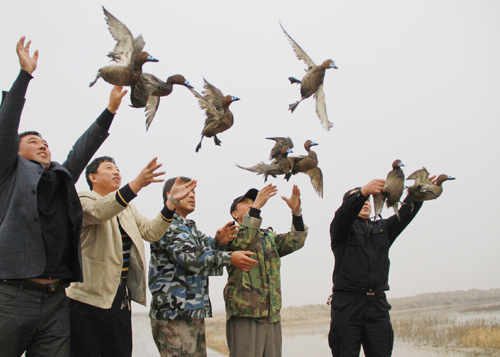|
 |
|
BACK TO NATURE: Wildlife conservationists let wild ducks they saved return to a wetland in Lindian County, Heilongjiang Province, on October 15 (HE JINGCHEN) |
In 1998, the Heilongjiang Provincial Government issued a circular ordering an end to wetland reclamation. The document said that in the future, food production would be primarily boosted by increasing the yields of existing fields through advanced farming techniques and better management.
Li wrote to the State Council in 2000 about the development project in his hometown and soon got a reply. Development on the remaining 4,000 hectares of wetland was called off, and the government also invested money in saving the wetland. In 2009, Li won a national award for his efforts to protect wetlands.
"So far, Heilongjiang has set up 73 wetland nature reserves, covering a total area of 4.17 million hectares," said Cai Binghua, Director of the Heilongjiang Provincial Forestry Bureau. In these reserves, more than 8,000 hectares of wetland have been restored.
The Sanhuanpao Nature Reserve on the Sanjiang Plain was set up in 2002. Since then, a large area of the reserve has been returned to its original wetland state.
"As more water entered the fields, water plants such as reeds and cattails mushroomed, then the fish and birds multiplied," said Yang Fengying, head of the administrative office of the Sanhuanpao Nature Reserve.
Lu Weifeng, Vice Governor of Heilongjiang, said that in the long run, the ecological value of wetlands outweighs their economic value.
Despite the government's efforts to conserve wetlands, illegal reclamation still continues in some places.
This August, national broadcaster CCTV reported a case in Shilipao Wetland near Heilongjiang's Tongjiang City. Populated with wild lotuses, ducks and other waterfowl, the wetland is a local scenic spot. But in 2009 about 27 hectares of wetland were converted into farmland.
In addition, a case was investigated in 2008 in Bachadao Nature Reserve near Tongjiang and 20 illegal reclamation cases were investigated in 2004 in the Sanjiang National Nature Reserve, the largest freshwater wetland in China, involving a total of 300 hectares, said CCTV.
Local residents said that recent grain price hikes made farming more profitable, which provided an additional incentive for wetland reclamation.
"As grain prices soar, farmers are keen to till more land," said Wang Xuwen, an official in charge of food supply in Tongjiang. Some farmers also make money by subcontracting land to others. Rental for one hectare of rice paddy reportedly reaches 4,000-5,000 yuan ($615-769) a year.
Zhang Fengjiang, an official in Heilongjiang's Naolihe Nature Reserve, admitted in an interview with the China Economic Weekly that stopping farmers from reclaiming wetland is "a very challenging job."
Every spring, farmers and reserve administrators play a tug of war. Some farmers surreptitiously plow and sow seeds in the wetlands, usually at night. While reserve administrators make efforts to destroy any seedlings they find, farmers often return and sow seeds again and again.
Recently, Zhang's team seized the vehicles of farmers illegally tiling the wetland, but farmers sued reserve administrators at the local court for illegal property seizure.
In the first-instance ruling, the court said that reserve administrators did not have a legal basis to seize the farmers' vehicles. The Naolihe Nature Reserve has appealed the ruling and a second-instance ruling is still pending.
Currently, about a dozen Chinese provinces have wetland conservation regulations, yet there is no law on wetland protection. Zhang said that the absence of such a law makes it difficult for reserve administrators to hold perpetrators liable.
Moreover, Zhang pointed out that although local residents' development activities were restricted after wetland reserves were set up, they were not properly compensated for their loss. "This has led to hostility and a lack of cooperation on the part of villagers," he said.
In 2010, China began a trial scheme that offered ecological benefit compensation to residents living near wetlands. A state-level fund has been set up for this purpose. Beijing-based People's Daily Overseas Edition said that in 2010 and 2011, the Central Government allocated 400 million yuan ($61.5 million) to the fund.
Distribution of Wetlands in China
The natural wetlands in China are unevenly distributed among eight wetland regions.
- The northeastern region of freshwater swamps;
- The northwestern region of saline lakes and swamps in dry climate;
- The southwestern plateau region of sub-alpine lakes;
- The southern and southeastern region of rivers;
- The coastal region of tidal swamps, salt marshes, and mud-lands;
- The middle-lower Yangtze River region of lake groups and river systems;
- The middle-lower Yellow River region of lake groups and river systems;
- The Qinghai-Tibet Plateau region of alpine lakes and swamp groups.
(Source: China's Natural Wetlands: Past Problems, Current Status, and Future Challenges) | 